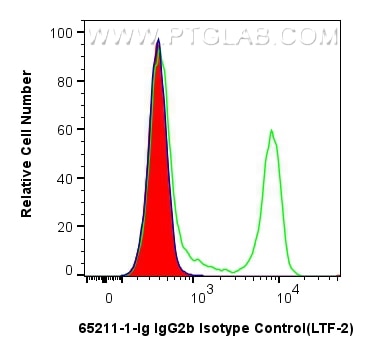Anticorps Monoclonal anti-IgG2b Isotype Control
IgG2b Isotype Control Monoclonal Antibody for FC
Hôte / Isotype
Rat / IgG2b, kappa
Réactivité testée
Applications
IF, FC
Conjugaison
Non conjugué
CloneNo.
LTF-2
N° de cat : 65211-1-Ig
Synonymes
Galerie de données de validation
Applications testées
| Résultats positifs en cytométrie |
Dilution recommandée
| Application | Dilution |
|---|---|
| This reagent has been tested for flow cytometric analysis. It is recommended that this reagent should be titrated in each testing system to obtain optimal results. | |
| Sample-dependent, check data in validation data gallery | |
Applications publiées
| IF | See 1 publications below |
Informations sur le produit
65211-1-Ig cible IgG2b Isotype Control dans les applications de IF, FC et montre une réactivité avec des échantillons
| Réactivité | |
| Hôte / Isotype | Rat / IgG2b, kappa |
| Clonalité | Monoclonal |
| Type | Anticorps |
| Immunogène | s/o |
| Nom complet | IgG2b Isotype Control |
| Symbole du gène | |
| Identification du gène (NCBI) | |
| Conjugaison | Non conjugué |
| Forme | Liquide |
| Méthode de purification | Purification par affinité |
| Tampon de stockage | PBS with 0.09% sodium azide |
| Conditions de stockage | Store at 2-8°C. Stable for one year after shipment. |
Informations générales
The LTF-2 immunoglobulin is useful as an isotype-matched control. The LTF-2 immunolglobulin has an unknown binding specificity and is used as an isotype control for rat IgG2b antibodies. This antibody has been quality-tested for flow cytometry as negative control.
Protocole
| Product Specific Protocols | |
|---|---|
| FC protocol for IgG2b Isotype Control antibody 65211-1-Ig | Download protocol |
| Standard Protocols | |
|---|---|
| Click here to view our Standard Protocols |
Publications
| Species | Application | Title |
|---|---|---|
Nat Commun The methyltransferase METTL3 negatively regulates nonalcoholic steatohepatitis (NASH) progression. | ||
Front Endocrinol (Lausanne) Ovaries of estrogen receptor 1-deficient mice show iron overload and signs of aging |


